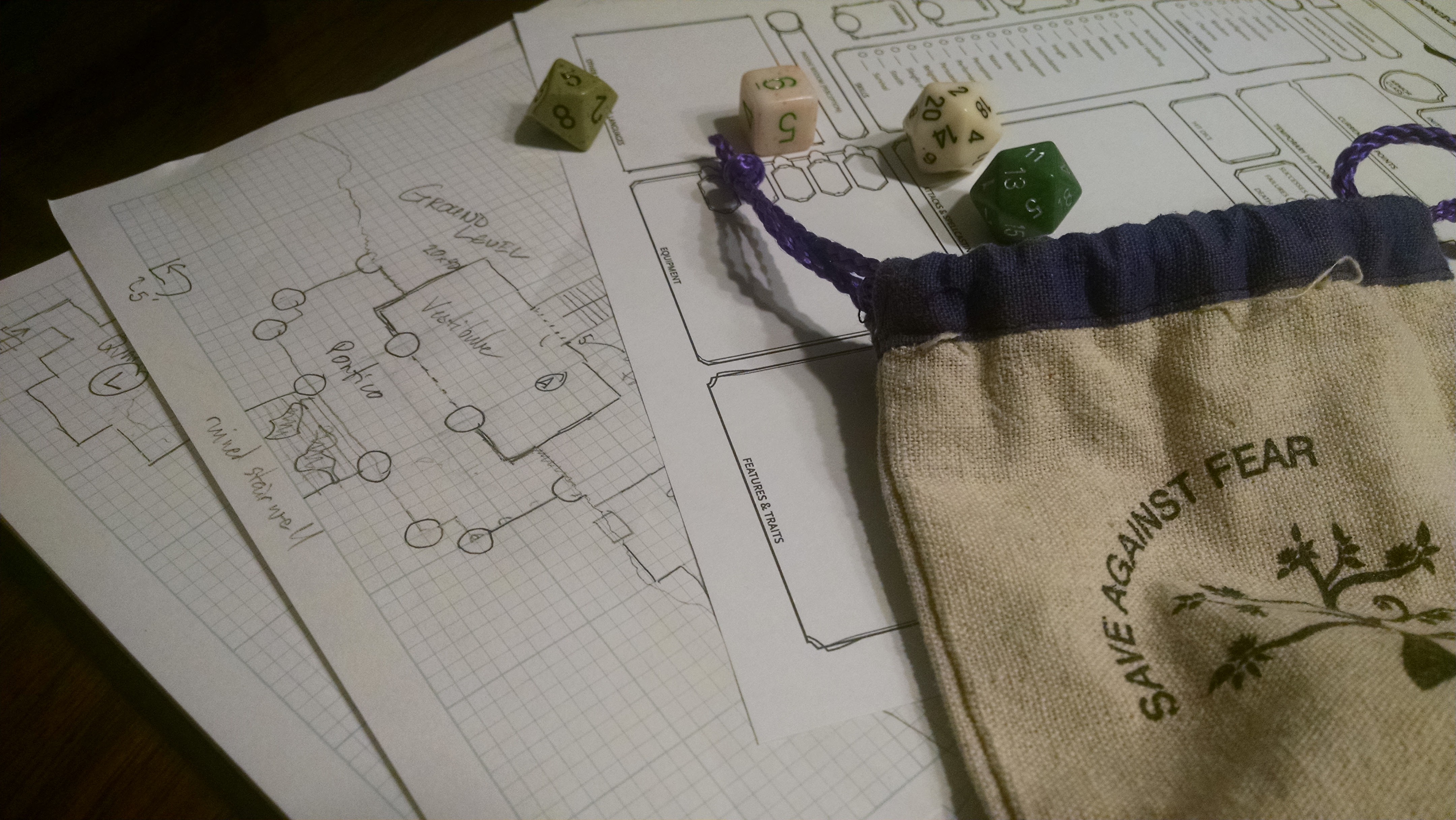A quick content warning: this post talks about self-harm in a religious context. If that’s a bit much, you may want to leave this one unread. Zero graphic description – just the acknowledgement of the practice.
If you listen to the podcast regularly, you’ll conclude (mostly accurately) that I’m less a fan of dark characters than my co-hosts. I’ve even written about it here on this blog. But as we were spitballing ideas for Princes of the Apocalypse PCs, I managed to come up with a concept that squicked Grant out enough to merit a veto.
Before we get into what exactly I did, though, I’m going to acknowledge that there are multiple flavors of dark. Darkness can be what a PC does to others in the case of an evil PC, what they’ve had done to them in the case of something like lycanthropy, or, as this PC would have been, what they’re willing to do to themself or put up with. I am pretty uncomfortable with the first kind, but if I can set set the boundaries myself, the other two are much easier for me. I’m on record as being a huge fan of Ross Leiser’s Accursed class, for example.
In addition, I have been getting a little bit of prodding, both internal and external, to get outside my usual character palette lately. I typically play religious, good-aligned, strightforwardly heroic characters in fantasy RPGs. They tend to be low-dex, clanking holy warriors who couldn’t sneak up on anyone or anything without a critical success on the roll. They may struggle with things like imposter syndrome and self-doubt (like Lambert did in the colony game) but there’s really nothing distressing about them.
Here’s the process that lead up to the offending character concept.
I thought I’d give something a little darker a shot and floated a rather troubled character concept. In Darkest Dungeon, there is a hero class called The Flagellant. It’s a front-line healer that has to take a certain amount of damage to really charge up its most effective powers. It’s got a mix of damaging and healing abilities and it’s really effective as a front-rank hero. The character in Darkest Dungeon could also best be described as “piously unhinged.”
An author of some other third-party 5e material that I’ve really enjoyed is working on his next book, and one of the subclasses that was previewed to us on his Discord is a fighter subclass that can weaponize its blood into lethal projectiles when it takes damage (or do the same thing with the blood of enemies it damages, so long as the source of the blood and the target of the blood weapon aren’t the same creature).
I figured that combining that fighter archetype with life cleric levels (the Life domain heals itself when it heals other characters) would allow me to replicate the power set of the flagellant from Darkest Dungeon. Riding the line of self-harm (or even just recklessness) and healing could make for an interesting character who really grapples with their image of the divine. In the forgotten Realms (where Princes of the Apocalypse is set) this seems like a natural fit for a follower of Ilmater. I also suspect that it would be very effective mechanically, settling into a rhythm of explosive damage output followed by powerful healing. Fighter and cleric multiclass extremely well in 5e anyway, and this would just double down on that by making the subclass abilities into a bit of a “damage pendulum.” I was planning on a much less deranged personality than the Flagellant from Darkest Dungeon (he seems a bit psychotic), but mechanically, the PC would be very similar, weaponizing the damage they took and patching up others and themselves with healing spells as needed.
Now, I’m going to pause here and say that I still like this concept, but I know there are some obvious points of discomfort.
The first and most obvious surface-level one is that the garb worn by real-world flagellants is visually very similar to the garb of the KKK. The KKK appropriated the appearance of traditional religious garb for their uniforms, but “who wore it first” for something associated with that level of terror is completely irrelevant. That’s the least of my worries, though. I wasn’t planning to dress the character in anything even vaguely like that sort of garb.
The next issue is that, especially to our modern eyes, particularly Protestant eyes, this kind of scarring, injurious mortification of the flesh paints a picture of religious practice at odds with our understanding of God’s nature. Stick a pin in this one, I’ll be coming back to it.
However, I suspect the most pressing issue in the case of this specific PC is that the members of the game group I’m in with my co-hosts is that we are all friends with a person who has severe PTSD and has a lot of self-loathing because of it. This individual has self-harmed in years past, and while the individual in question is not playing in this game, that kind of real-world parallel potentially makes this kind of character uncomfortably close to home..
And of course there’s also just the regular old creepiness factor of blood and self-injury as a power source.
I am not sure what factor or combination of factors lead Grant to veto the concept, though if he feels like weighing in, I’m definitely interested to hear what he has to say – but that’s a standing “Grant is a thoughtful and interesting dude” thing. Because in the end, it really doesn’t matter – the idea made a friend and game group member uncomfortable, we’re done here. That’s basic safety techniques in a nutshell. The players are more important than the game.
I would still like to pull this concept out some day, because I have a very specific arc in mind. I have been pretty transparent that I carry around a lot of angry God theology baggage. We have talked a lot about redemption as moving from evil toward good on the podcast, but I think it would be interesting to play a character that moves from self-loathing and unhealthy to one that trusts in the love and care of [their] god over time. Redemption as moving from unhealthy to healthy, if you will. Especially if that didn’t result in a change in mechanical abilities. Because at that point it becomes a matter of “I have accepted that my god doesn’t want me inflicting all of this pain on myself, but what do I do with these abilities centered around that now?” Because of my own struggles, I’m pretty confident I could do such a PC justice.
In retrospect, this concept is probably better reserved for a more introspective game like the colony game was. Even if the concept had been totally fine with everyone else, the game itself is not going to be a particularly fertile field for in-depth characterization and character growth. An official module like Princes of the Apocalypse is going to be action movie-like in its tone and Grant has mentioned to us a couple of times that really deep characterization isn’t going to be necessary. So I’ve got some hope that I’ll someday be able to play the PC, but now is definitely not the proper time. It may never be the proper time to play that concept with the group I originally pitched it too, and that’s perfectly okay!
I do, however want to touch on this: it’s okay to come up with “out there” concepts, but if you think they might be too much for the group for whatever reason, it’s a good idea to vet them as far ahead of time as you can. If I’d just been planning to play a human Circle of Dreams druid from a happy home who works as a wandering healer, that probably would not have merited a check-in like this did. I ran this concept by the group ahead of time because I knew there was a very real change that it would get vetoed, and I wanted to give them that choice. The other important thing is that if you’ve got a concept in mind and it turns out to be too much, you need to let it go as soon as you know someone is uncomfortable. The same goes if it just doesn’t fit. If I’d decided that I wanted to play a rabbit-person startship pilot, that also would have most likely been shot down. There’s more than one good PC concept out there. This is why I get frustrated when I see people digging in their heels online about wanting to play evil characters in otherwise good parties. Do you really not have any ideas that will work with the rest of the group and that the rest of the table will be comfortable with?
By the way, I did still ultimately manage to break the mold of my usual PC concepts at least a little. I’m playing a sneaky Skald character; a half-elf bard: College of Valor with the spy (Harpers) background. Still good-aligned and I’ve still got my usual healing spells (I tend to feel a little uncomfortable without them, truth be told), but he’s a skill monkey and the bard-specific features like inspiration and Jack of All Trades will make for a much different experience than my usual cleric. I spent a bunch of time second-guessing that build because it’s so far outside the norm for me, but now that I’m committed, I’m looking forward to seeing how he plays out.
Photo by Michael Mouritz on Unsplash



